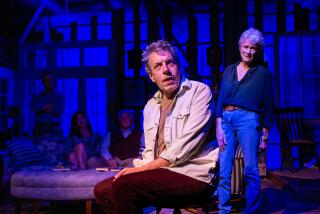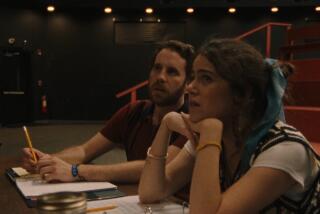EMIGRE COUPLE’S CLOWNING TOUCH
- Share via
Olga Serova, a small, lithe young woman with close-cropped hair, spoke with passionate intensity: “Theater is life. Theater means people--an explosion of emotion.”
The Soviet emigre is half of “Max and Frossie, Stage Players,” a spirited, deceptively subtle, Chaplinesque clown show for young children playing on Sundays at Santa Monica’s Powerhouse Theatre. Her partner on the bill, and in life, is Eugene Kozhevnikov.
“Theater doesn’t mean a building,” she said, leaning forward across an old wooden kitchen table, gesturing eloquently with strong hands. “We put our love and life in every inch of our work.”
Interviewed with her husband at the small, sparsely furnished apartment on the fringe of Beverly Hills, where the couple live with their 14-year-old son and 4-year-old daughter, Serova threw herself eagerly into the conversation.
Kozhevnikov, bearded and compactly built, dark eyes serious behind glasses, was more cautious, struggling with the vagaries of English grammar.
“We decided to build a children’s theater here and see what would happen,” he said haltingly. “American children are influenced from the television, cartoons and commercials. We know we cannot build a show and bring just our European or Russian tradition (to it), because for American children it will be very strange.”
American television was a shock to the two Soviets, who were distressed by its violence. “We saw some American cartoons,” Kozhevnikov said. “They hit all the time. Why?”
It was on public television that Kozhevnikov and Serova found kindred spirits.
“ ‘Mr. Rogers (Neighborhood)’ and ‘Sesame Street’--this is the best,” Serova said. “Whatever they do, they do with meaning. Like us, they are soft and cheerful.”
The path the couple has traveled to get here, however, has been neither soft nor cheerful.
Graduates of the Moscow School of Circus and Variety Arts, they had independently produced and performed a satiric political revue in 1974-75 while working as clowns in the Vladimir Children’s Circus. That work was labeled “anti-Soviet” by Communist Party officials.
In 1976, Serova and Kozhevnikov were denied exit visas and barred from performing in any Soviet venue.
The couple went underground, performing a new satiric comedy, “The Refuseniks,” to boost the spirits of others who were struggling to emigrate. They survived with the aid of several families in London, who sent them food packages and “gifts” to sell.
“You have to understand what means ‘refusenik,’ ” Kozhevnikov said. “When you apply for exit visa you lose your position as loyal to the Soviet system. You’re fired from your job. You can’t support your family.”
In 1979, they were among those granted permission to leave the Soviet Union after Sen. Edward Kennedy and members of British Actors Equity petitioned then-president Leonid I.Brezhnev.
Kozhevnikov and Serova put their dream of a children’s theater on the shelf and brought “The Refuseniks” to the United States, hoping to stimulate help for those left behind. The lack of response was painfully disillusioning. They stopped performing the show live in 1985.
“We broke our hearts for many years to try to gain attention of American Jews to this problem (of Russian Jewish emigration),” Kozhevnikov said quietly. “During the performance, they reacted, they are crying, laughing. After each show we told how to help. . . . “
“Everybody wrote down our phone number,” Serova interjected.
Kozhevnikov’s voice rose with emotion: “But, nobody called.”
Serova’s eyes glistened. “(Refuseniks) become very angry and feel so lonely. Some are waiting 15 or 20 years. They go out of spiritual shape. It’s very important to know someone cares.”
More to Read
The biggest entertainment stories
Get our big stories about Hollywood, film, television, music, arts, culture and more right in your inbox as soon as they publish.
You may occasionally receive promotional content from the Los Angeles Times.










